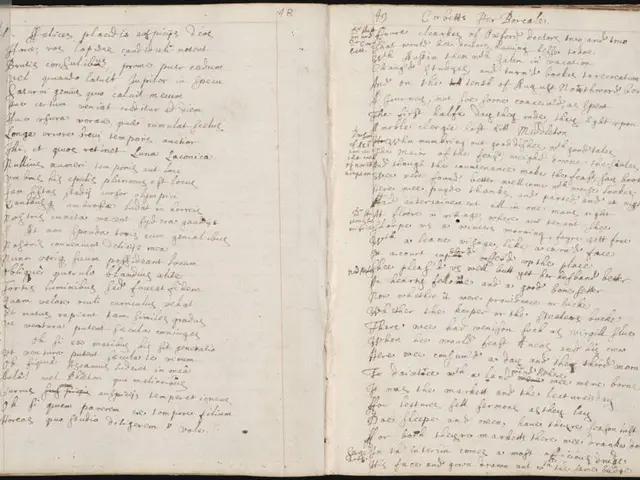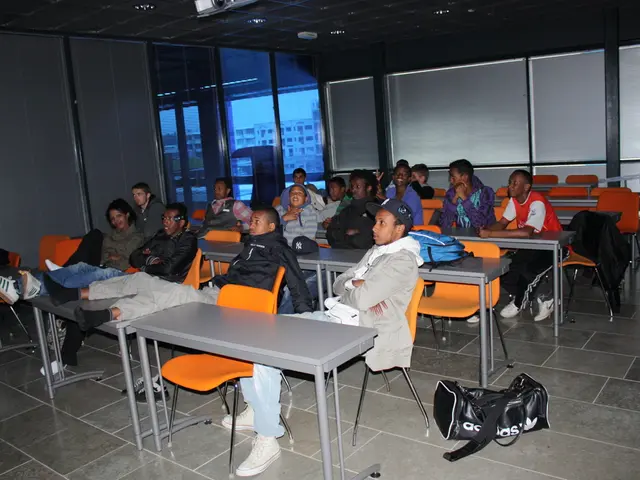Advocates Push for Educational Freedom, Oppose Religious Discrimination for Families Seeking Best Fit for Their Children
Boldly Challenging the Old Guard: The Supreme Court Battle for Oklahoma's Education Freedom
Welcome to our fresh take on the top headlines of the day, where we dive into the fray of issues that matter most. Today, we're diving deep into the U.S. Supreme Court's impending decision that could shake up the educational landscape of Oklahoma and beyond.
Elbowing Our Way to World-Class Education
Politics, money, and innovation have been dancing around each other for decades, trying to find the winning formula for a top-tier education system in the U.S. The truth is, despite massive investments in public education, our test scores leave much to be desired. In fact, according to the Organization for Economic Cooperation and Development (OECD), the U.S. lags behind numerous countries in standardized test scores, particularly in math[1]. This status quo is unacceptable, and we believe that one potential solution lies in providing families with more educational choices, such as private and religious schools.
On the Line: Oklahoma's Charter School Future
As the battle rages on, we find ourselves at the precipice of a Supreme Court decision that could make or break Oklahoma's education future. The controversial case centers on St. Isidore of Seville Catholic Virtual School, a faith-based educational institution vying to become Oklahoma's first taxpayer-funded charter school[3]. The Oklahoma Statewide Charter School Board approved the school’s application, but their victory was short-lived when the state’s Supreme Court intervened, citing a state law prohibiting charter schools from incorporating religion in any aspect of their operations[1][3].
Legal Brawl: Free Exercise vs. Establishment
As the battle lines form, the legal questions at the heart of this case revolve around classifying the school as either a government entity (subject to church-state separation rules) or a private contractor (protected under religious freedom principles)[1][3]. Proponents argue that excluding religious groups from charter funding violates the Free Exercise Clause by unfairly targeting their beliefs, while opponents warn of potential religious endorsement and the breaching of the Establishment Clause[1][3].
Justice's Grilling: Paving the Path Ahead
Preliminary evidence suggests that the Court’s conservative majority may lean in favor of the school’s arguments, based on the justices’ questioning during oral arguments on April 30, 2025[2]. For example, Justice Neil Gorsuch probed the potential unintended consequences for charter schools nationwide if states respond by imposing stricter regulations[2]. Legal experts note that the case builds on recent rulings requiring religious neutrality in public benefit programs, such as school vouchers, under the Free Exercise Clause[3].
A Decision Looming: The Future of Educational Freedom
As we await the Court's decision, expected by June 2025[3], the implications for charter schools and the broader educational landscape could be far-reaching. The outcome could redefine charter schools’ role in religious education and set a precedent for how states balance anti-discrimination mandates with church-state separation[1][2].
Parents Speak Up: Oklahoma's Diverse Educational Needs
Okahomans have been fighting for educational freedom for decades, and the arrival of virtual charter schools has offered a promising new frontier for parents seeking a better education for their children[1]. Rural areas, in particular, could benefit immensely from virtual options that deliver quality educational opportunities to even the most remote communities[1].
Empowering Parents: Changing the Game
At the heart of the St. Isidore case is the idea that parents should be given the power to decide what’s best for their children, rather than having their options dictated by government bureaucrats[1]. The Supreme Court’s decision could represent a critical step forward in this movement, giving families more educational choices and fostering a competitive and dynamic educational environment.
The New dawn of Parental Empowerment
Ryan Walters, Oklahoma's state superintendent of public instruction since 2023, firmly stands by the notion that parents are in the best position to make decisions regarding their children’s education. Walters, a former high school history teacher and education reform advocate, is committed to giving parents control over their educational choices and implementing conservative policies in public education[1]. Hiram Sasser, executive general counsel for First Liberty Institute, a nonprofit law firm dedicated to defending religious freedom, has voiced his support for St. Isidore's case, arguing that the exclusion of religious groups from charter funding violates the Free Exercise Clause[1].
Join the Fight for Oklahoma's Education Freedom
As the Supreme Court prepares to issue its decision, it's essential to keep the conversation alive. Will the Court uphold religious freedom and choice, or will they cling to outdated notions of church-state separation? We invite you to join us in standing up for educational freedom, as we work together to give Oklahoma parents the power to determine their children’s futures.
[1]https://www.nbcnews.com/news/us-news/oklahoma-s-virtual-charter-school-aims-becoming-first-state-funded-n1336131[2]https://www.supremecourt.gov/oral_arguments/argument_transcripts/2024/22-630_1cwb.pdf[3]https://www.firstliberty.org/press-releases/news-releases/2025/04/oklahoma-supreme-court-to-hear-case-on-whether-catholic-virtual-school-may-participate-in-statewide-charter-school-program/[4]https://archstlouis.org/media-center/news/upcoming-oklahoma-supreme-court-case-testing-religious-neutrality-in-charter-school-laws
- The Supreme Court's decision on St. Isidore of Seville Catholic Virtual School could reshape the standardized rules regarding charter schools and religious education, potentially leading to a shocking shift in the politics of education.
- The ACLU has expressed concerns about the potential consequences of the Supreme Court's decision, warning of the potential breaching of the Establishment Clause and the endorsement of religion in education.
- Education-and-self-development experts argue that the 19th century's strict church-state separation may not apply to the contemporary world, with many calling for a more flexible approach to education, incorporating a variety of options like private and religious schools.
- Surprisingly, the general news landscape has been abuzz with stories of parents advocating for educational freedom, particularly in states like Oklahoma, where the lack of diverse educational options has long been a pressing issue.
- As the Supreme Court prepares to rule, shockwaves will ripple through the sports, politics, and education sectors, as this case has the potential to redefine the notion of education and self-development in the United States.







